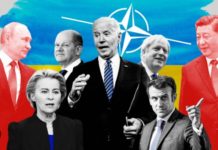France and UK spar to be leading US military partner in Syria
By Chris Marsden
11 April 2018
France is playing the leading European role alongside the United States in preparing for military action against Syria that threatens a direct confrontation with Russia.
US President Donald Trump has held two conversations with French President Emmanuel Macron, the latest on Monday night. On Tuesday morning, France issued a statement pledging to retaliate against Syrian President Bashar al-Assad if it is proved that his government and armed forces were responsible for the supposed chlorine gas or nerve gas attack in Eastern Ghouta.
Referring to Macron’s earlier declaration regarding the use of chemical weapons, spokesperson Benjamin Griveaux told Europe 1 radio, “If the red line has been crossed, there will be a response,” before adding that intelligence “in theory confirms the use of chemical weapons.”
A French statement explained that both countries had “exchanged analyses confirming the use of chemical weapons.”
So politically vital is the relationship being forged between the US and France that CNN ran an April 9 op-ed by former New York Times columnist David A. Andelman titled, “With France in, Trump has no excuse not to act on Syria.”
Andelman voiced his ire over events in August 2013, when President Barack Obama and his French counterpart, François Hollande, pledged united military action over false claims that Assad had used sarin gas, but Obama “pulled back from the abyss, with French bombers poised on their runways.”
Today, Andelman wrote, with Macron scheduled to pay a state visit to the White House in two weeks, “there is every reason for Trump to steel himself and go into battle with a staunch friend and ally, Macron’s France, at his side…”
Britain’s ruling elite, whose foreign policy depends on preserving the vaunted “special relationship” by being first off the blocks in any US-led war, is apoplectic at this latest turn of events. The media overflows with militarist rhetoric mixed with expressions of concern at being overshadowed by France.
Rupert Murdoch’s Times quoted “senior figures” warning Prime Minister Theresa May of the UK “losing influence in Washington to France if it turned down a request by President Trump to join a retaliatory strike.” The article added, “President Macron of France was said by Whitehall sources to be ‘egging on’ Mr Trump.”
Downing Street had been “left embarrassed as Mrs. May was still waiting to speak to Mr. Trump last night,” the Times continued, leaving Foreign Secretary Boris Johnson speaking alternately to “his US and French counterparts yesterday as he sought to keep Britain within any joint action.”
The Daily Telegraph, the house organ of the Tory Party, was equally warlike and concerned at the UK losing influence with the US to France. It too noted how the UK’s standing with Washington was undermined when, on August 30, 2013, Conservative Prime Minister David Cameron, faced with widespread anti-war sentiment and divisions in the military, called a parliamentary vote on a planned strike on Syria and lost. This played a significant role in Obama backing down over Syria the next day.
The Telegraph wrote, “The fact that Mr. Trump called French President Emmanuel Macron prior to calling Mrs. May should be seen as an indication of Washington’s enduring wariness about Britain’s ability to support military interventions.”
Thanks to Cameron, “the parliamentary precedent has now been set whereby any overseas intervention by the British military requires Commons approval,” it complained. “Unlike Mrs. May,” it continued, “the French president has no constraints on his authority when it comes to launching military action, and if Washington is looking for a prompt response against the Assad regime, he might find the French are in a better position to act than the British.”
Britain’s loss of position is only acting as a spur to its offering the use of a Royal Navy attack submarine armed with Tomahawk cruise missiles or possibly Royal Air Force fast jets capable of firing Storm Shadow cruise missiles.
Speculation is rife over whether May will now act without parliamentary approval and reverse the precedent set by Cameron, or, in what is considered a less likely move, recall MPs from their Easter break.
The Tory right is adamant that May should proceed without parliamentary approval. Tom Tugendhat, chairman of the foreign affairs committee, told May to “stick with your allies… We can be legalistic or we can be realistic.”
A senior military source took the same line, telling the Times, “You have to examine options… [It is] a prime minister’s decision at the end of the day.”
The most politically vicious response came from Tory MP John (Johnny) Mercer, a captain and career soldier until 2013. Writing in the Telegraph April 8, Mercer denounced a parliamentary vote and the possibility of Labour MPs led by Jeremy Corbyn opposing actions as symptoms of broad-based anti-war sentiment that must be fought.
“The nation’s politics have become nauseatingly pious since Iraq,” he wrote. A parliamentary vote was “a uniquely useless way of conducting foreign policy, and in almost one action emasculates us on the world stage… It is a cop-out to go to Parliament on issues of national security…”
He continued: “It is now time get out there and tell the British people what modern warfare is about,” including targeting “every individual inside Syria involved in the chemical weapons decision-making cycle,” levelling military bases and recognising that Assad “should have been dead long ago.”
“We don’t shy away from targeting individuals with drones in their beds because the political risk is too high,” he insisted.
Writing again in the Sun, Mercer focused his ire on “my largely Labour Party fellow parliamentarians [who] voted against taking military action against President Assad in 2013… You can draw a clear correlation between our vote in Parliament in 2013, Obama’s unenforced red line in 2013 and an emboldened Putin and Assad.”
The Sun ’s own warmongering centred on a denunciation of Corbyn for his past leadership of the Stop the War Coalition, which was more concerning than “his dalliances with IRA sympathisers and Soviet spies.”
Stephen Bush suggested in the pro-Labour New Statesman that no one need be too concerned at a parliamentary vote because, even though Corbyn is urging a political solution, “There is a significant group of Labour MPs who bitterly regret not voting with the government in 2013 and that buffer of 30 to 50 MPs means that if May wants some kind of military response to this attack, she has the votes for it.”
Bush is correct in his appraisal of the parliamentary arithmetic, thanks to Corbyn’s refusal to oppose the naked warmongers in his own party. With Tony Blair himself stating that no Commons vote is needed on war, the Blairites’ position was epitomised by Simon Tisdall in the Guardian, who insisted, “It’s time for Britain and its allies to take concerted, sustained military action,” ending the situation where “hands are thrown up in horror at the prospect of another open-ended, armed Western intervention in the Middle East.”
But this is not simply about a parliamentary vote. The British ruling class is both vitriolic in its attacks on Corbyn and bitterly opposed to any repeat of a democratic vote on its war plans, no matter how meekly Corbyn frames his protests, because this might provide an impulse to the widespread anti-war sentiment among workers and youth.
May appears to have heeded the advice, convening a meeting of the National Security Council yesterday to discuss the UK response and speaking directly to Macron and Trump.











